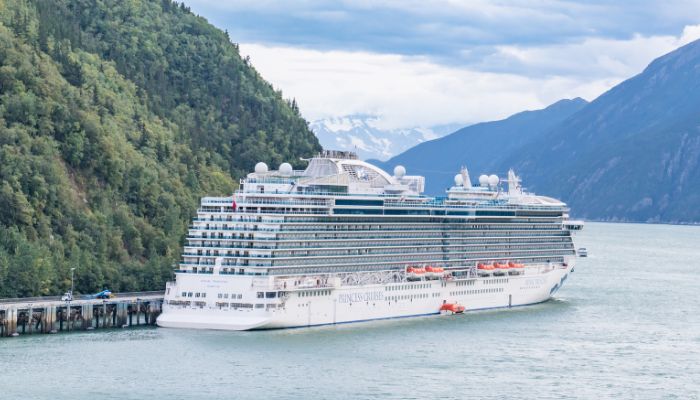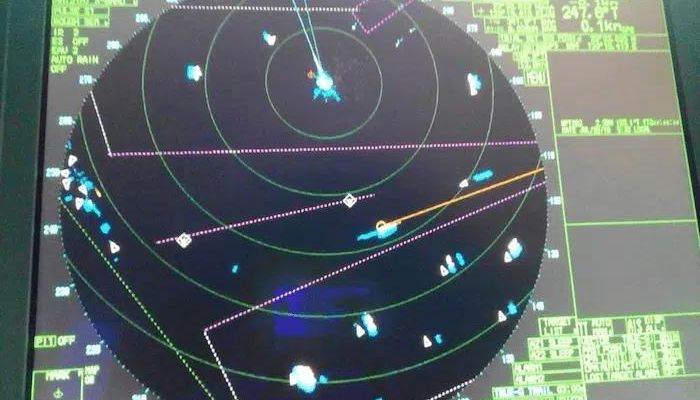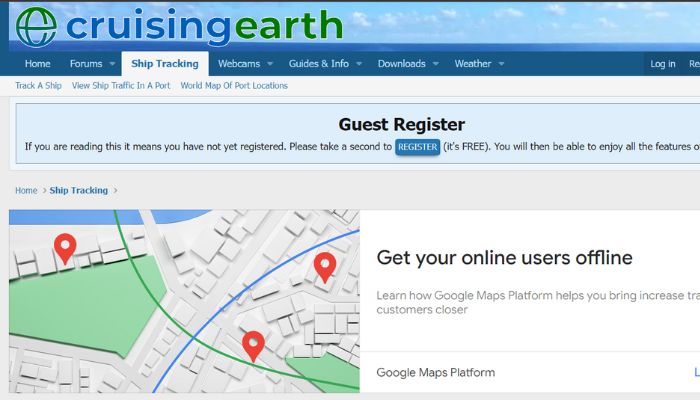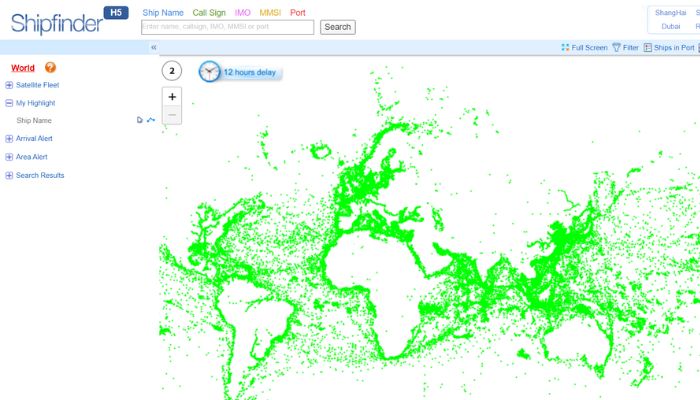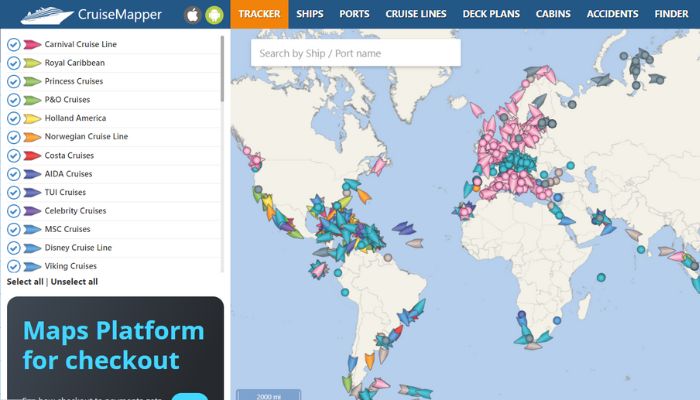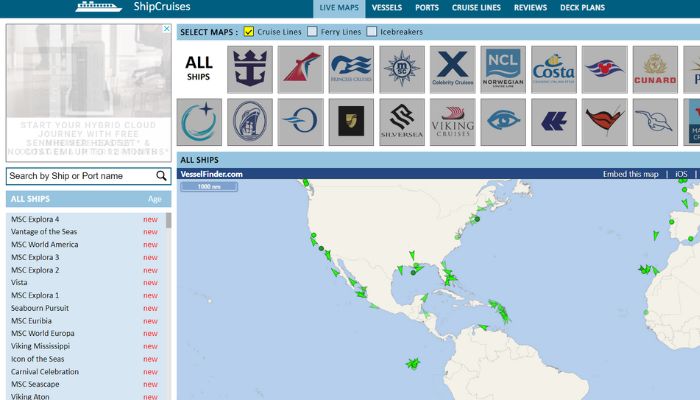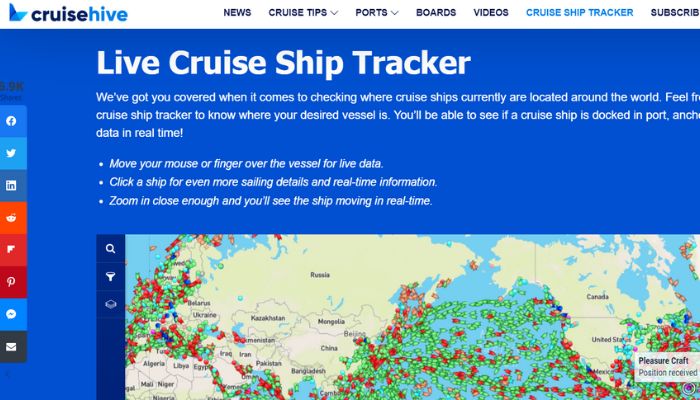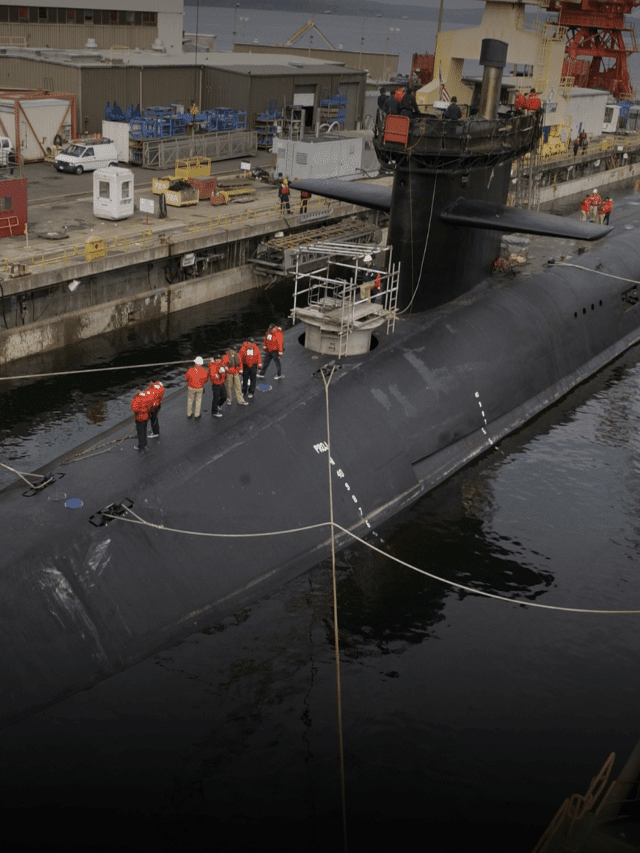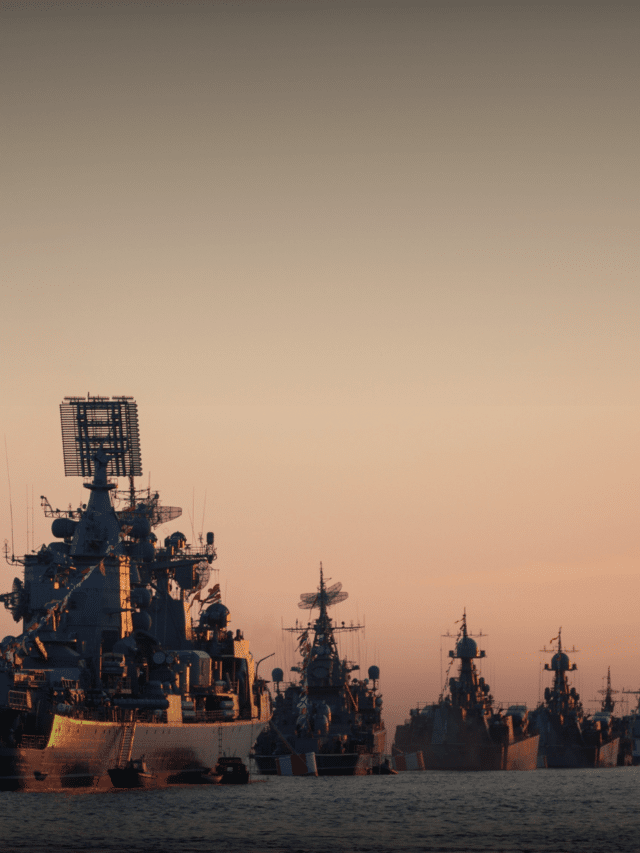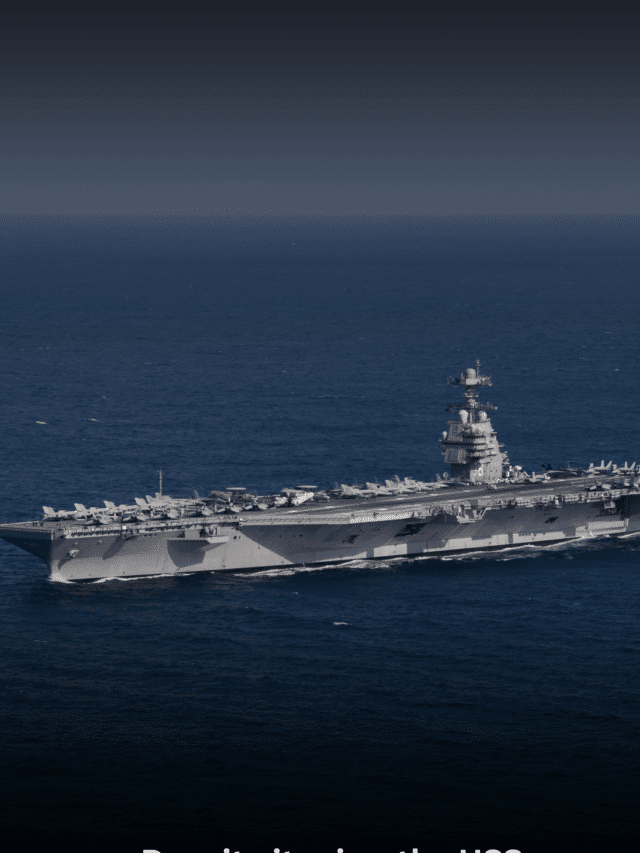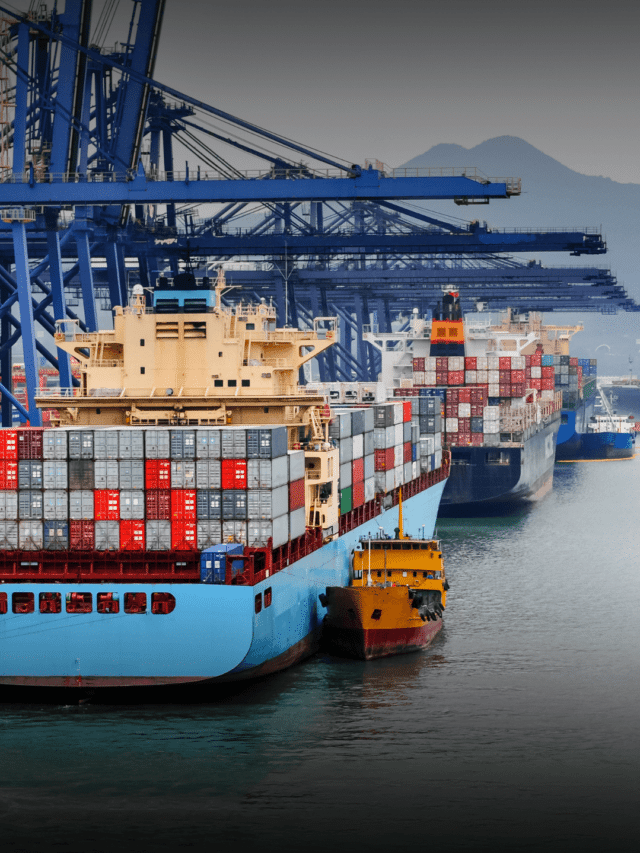5 Websites To Track Cruise Ships
There are hundreds and thousands of ships that ply the waters of the world’s oceans, often traversing the same maritime routes. The ability to track ships prevent collisions and ensures the safety of the crew, passengers and cargo. Modern technology has made it possible to know the real-time location of vessels, where it’s destined to be, their sailing speed, identity etc., which has made maritime transportation and travel a lot safer and more comfortable.
Almost every ship carries equipment which transmits its position to the authorities and vessels nearby. Ship tracking also helps maritime law enforcement by identifying the vessel that broke the law.
Other useful technologies like the radar show the position of other vessels, and systems like ship-to-ship tracking aid the crew in plotting their course.
One can track all kinds of ships, including cargo vessels, oil tankers, fishing vessels or cruise ships. We will be focussing on the latter in this article.
There are many great and easy-to-use cruise ships tracker websites that aid in knowing the ship’s specific location or the maritime traffic at a particular cruise port. They are especially useful when there are delays due to weather, climate or other factors like a machine failure. It allows you or your loved one to know whether your ship has made it to the port or far it is from its destination.
While one might use trackers for safety reasons, they are also used for recreational purposes like knowing which places you are cruising past. This is a great way to learn about the region’s geography and have a sense of belonging with the place, making the journey even more worthwhile and memorable.
Which system enables you to track cruise ships?
Have you ever thought about how a vessel’s real-time location is made readily available to you? Well, the answer is through a system installed on all vessels called the Automatic Identification System, also known as the AIS.
It sends or transmits the current position of the ship every two to three minutes to the base stations spread across the world. In fact, there is a regulation which states that every ship must have an AIS onboard, which comes in handy in emergencies created by weather, rough seas or accidents, piracy etc.
If you’re thinking about how this AIS works, hear this out. It is a radio system that uses signals to transmit a vessel’s navigation information at all times when it is switched on. It makes sea voyages safer by transmitting statistical and voyage-related information at regular time periods via transmitters. Crew can maintain contact with authorities on land through the receivers.
Some More information about the AIS
AIS is basically a short-range coastal tracking system formed to identify and locate vessels and send their data to shore stations. The system is said to be the biggest advancement in the world of maritime safety since the beginning of radar.
It helps to identify vessels and allows target tracking, searches and rescue, and exchange of information and awareness, too, per the requirements of the IMO. The IMO Convention for Safety of Life at Sea or SOLAS Regulation V/19.2.4 states that for all ships weighing over 300 gross tonnes or more and engaging in international travel, all passenger ships and cruise ships of any size must have an AIS onboard.
AIS was formed to prevent collisions and allow commercial ships to identify each other by communicating the vessel’s information like position, course, speed and other data to ships within the range. AIS also enables the port authorities to regulate maritime traffic and mitigate risks of accidents linked to navigation in international, particularly dangerous waters.
How does the AIS work?
Many factors, like the signal propagation situation, the conditions at sea, the height of the antenna and the intensity of the ship transmitter, affect the range of reception. AIS usually has a separate antenna or even a splitter from the VHF radio that can be combined with the antenna for better communication. However, if the slipper is used, then it must be compatible with AIS transponders and VHF radios.
Under favourable circumstances, the reception can be close to twenty nautical miles or 37 kilometres which is a strong transmission.
There is a sensor situated within the AIS, which allows for tracking the vessel’s position and movement. This information is then combined with other information such as the MMSI number, name of the vessel, its destination, kind of vessel- passenger or cargo, cargo type onboard etc. and transmitted regularly while receiving such AIS info from other ships in the vicinity.
Can you track any and every ship?
Most ships use a combination of AIS satellite relays and VHFs or very high-frequency radio to transmit and receive important data. The data is processed by the system and made available to the users.
One thing to keep in mind is that all the free ship tracking websites use VHF based on land rather than the AIS based on a satellite to get ship data since it is less costly. Hence, online trackers are most reliable when the vessel is close to the shore or can get land-based reception of AIS.
Some organisations also provide accurate online real-time ship tracking using the VMS or vessel monitoring systems and AIS to generate real-time maps of vessels and boats. AIS is truly a technological marvel which protects lives, makes maritime transport simple and offers essential information about the world maritime economy.
The messages created and transmitted by the AIS contain important information. For instance, every message entails the GPS location of the vessel from which the message was sent.
Also, if someone has the vessel’ unique identification number, one can get more information about that particular vessel. That’s how the ship tracking websites on the internet offer the users plenty of information which is not restricted to only tracking or finding the current location.
Some famous websites like MarineTraffic offer enormous information about each and every vessel, such as its draught, length and breadth, the ship’s nationality, its destination, its average and maximum velocity, its estimated arrival time, the time of departure etc.
The best thing is users can access all this information for free. However, if someone wants more comprehensive information, then one might need to pay or get a subscription to access the other data.
Why should you track cruise ships or any ship?
Cruise ship tracking is important for the safety of all guests and crew. It is also legally mandatory and enables everything onboard to run smoothly. Tracking ships and their routes allow the captains and crew to plot their routes to avoid harsh weather or rough seas. Heat sensors allow the personnel to know which routes have more traffic.
One can also see the direction in which the ship is heading and also the direction of nearby ships. Vesselfinder notifies when another vessel is close by and that your ship should change course or contact the other ship to prevent a collision so both vessels cross paths safely.
The ever-expanding cruise sector is worth billions of dollars.
Today, the cruise industry is expanding and earning handsome revenues. Per Statista, the global cruise sector earns a whopping 27 billion dollars in revenue and more each year, and this is estimated to increase by 10% in the near future.
Hence, cruise lines strive hard to make their guests’ experience more fun and safe by establishing modern fleet operation facilities that allow the sharing of real-time information between these centres and the specific cruise fleet. These facilities focus on smooth sailing operations, efficiency and also sustainability.
Now that we know how cruise ships are tracked, the working of AIS and its importance in maritime navigation, let us know about some websites that can help us track cruise ships.
1. Cruising earth
Cruising earth allows you to track ferries, research and military vessels, US Naval and coast guard ships, famous ships and cruise ships as well. One can track a specific vessel by typing its name in the search bar or selecting the name from the options in the drop-down menu, as the website gives a list of 124 different cruise lines whose ships can be tracked.
When you track a cruise ship, you will get more details about its real-time location, course, next port, speed, estimated arrival time and much more. However, you have to register on the website before you can see all this information.
It displays an interactive map of the ship, and one can also look up traffic at a port. The website helps you to plan a cruise trip and has a section where one can track the weather conditions. It also has a forum where people can post queries about their upcoming voyages.
Although the site is quite useful, its dated interface is a little confusing, especially for first-time users. However, it is great for people who are from a maritime background.
2. Shipfinder
Ship finder is another handy tool for tracking ships online. It allows users to search for a vessel by using its identification number, tonnage, capacity, nationality etc.
It accumulates the AIS feeds utilised by ships weighing over 300 gross tonnes, passenger ships, small vessels, pleasure crafts, yachts etc. and displays real-time information.
It is quite accurate, and the website and its mobile application are used by a range of people, including marine professionals, port pilots, dockside workers and even maritime enthusiasts. It can be used by a friend or relative who wants to know more about their loved one’s ship, when it’s going to arrive at the port, and so on.
3. Cruisemappaer
One of the easiest-to-use websites for tracking cruise ships, cruisemapper allows you to choose the cruise line whose ship you want to track from the homepage. Then it shows a map portraying the routes taken by all the ships of the particular cruise line’s fleet.
The arrows on maps show a cruise ship’s route and where it is headed. The points indicate where a cruise ship is berthed.
The website also shows information about a port, a ship and its location and homeport. It also gives details about the number of cabins on that vessel, other important news, recent happenings or accidents close by etc.
When searching for a specific port, it shows the location and gives information about the port city and the popular hotels, restaurants and tourist activities and attractions. People can also ask questions and plan their itineraries accordingly.
When compared with other tracking websites, Cruise mapper offers the most comprehensive information on cruise ships, cruise lines and ports.
4. Ship Cruises
Ship cruises allow users to track cruise ships, ferries and icebreakers. It enables you to track cruise ships, read online reviews of the passengers who travelled on that ship, see deck plans and much more.
One can also look at the cruise ports and the different ships arriving and departing from the same. From the vessels tab, one can click on the chosen cruise line and then select a particular ship from its fleet to know more about the fleet and the history of the specific vessel, along with its dimensions.
5. Cruise Hive
This website gives live information about hundreds of cruise ships and also cargo vessels. If you want to track a ship, simply type its name in the search bar given on the homepage. You can also search ports.
The website makes a clear distinction between cruise ships and commercial vessels. It shows interactive maps and different pointers for ports, cargo vessels, fishing boats, tugs, high-speed crafts and oil tankers.
It is easy to use, and one can click on a particular symbol on the map to learn about a ship or a port.
You might also like to read-
- Norwegian Cruise Line’s Cruise Ship Norwegian Dawn
- The World Largest Cruise Line: Carnival Cruise Ships
- Amazing Cruise Ship: Grandeur of the Seas
- What are Polar Cruise Ships?
Disclaimer: The authors’ views expressed in this article do not necessarily reflect the views of Marine Insight. Data and charts, if used, in the article have been sourced from available information and have not been authenticated by any statutory authority. The author and Marine Insight do not claim it to be accurate nor accept any responsibility for the same. The views constitute only the opinions and do not constitute any guidelines or recommendations on any course of action to be followed by the reader.
The article or images cannot be reproduced, copied, shared, or used in any form without the permission of the author and Marine Insight.
Do you have info to share with us ? Suggest a correction
Subscribe To Our Newsletters
By subscribing, you agree to our Privacy Policy and may receive occasional deal communications; you can unsubscribe anytime.
Web Stories

About Author
Zahra is an alumna of Miranda House, University of Delhi. She is an avid writer, possessing immaculate research and editing skills. Author of several academic papers, she has also worked as a freelance writer, producing many technical, creative and marketing pieces. A true aesthete at heart, she loves books a little more than anything else.



